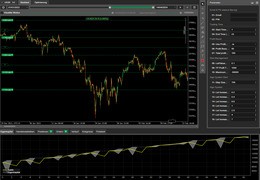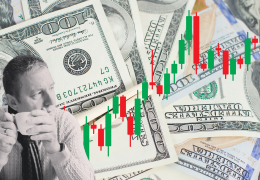Between reality and illusion If you want to know what trading really means—beyond luxury cars, piles of cash, and...
Search in blog
Blog categories
- FAQ – Your guide through the world of finance and technical facilities (2) click
- Daytrading Almanac (27) click
- Press release (23)
- Educational (26) click
- Projects (9)
- Chart analysis (39) click
- Trading bots for cTrader (11)
- AI in trading (5)
- Trading Strategien (11)
- Trading signals and stock market letters (46)
Latest posts

When it comes to traders, social media platforms often create a rather one-sided image: a young face smiling at the...

The TegasFX Instant Funding program sets a new standard for traders seeking quick access to capital without having to...

Backtesting trading strategies is an essential tool for traders who want to validate their methods across historical...

introduction In the world of trading, it can be challenging to balance the intense market activity and the rapid...
Popular posts





Featured posts





Photo gallery
No featured images
Archived posts
Top authors
-
 Christian Lill 70 Posts View posts
Christian Lill 70 Posts View posts -

-

-

-

The geopolitical consequences of the end of the petrodollar Part 2
The rise of a multipolar world order
The end of the petrodollar could reorganize the existing balance of power worldwide. Saudi Arabia's decision not only calls into question the dominance of the US dollar, but also signals a departure from a unipolar world that has long been dominated by the US. The BRICS countries, which have been preparing for this possibility for years, are now emerging as alternative centers of power.
The multipolar world order promoted by the end of the petrodollar could lead to a new era in international relations. States could increasingly rely on regional alliances and multilateral cooperation to protect their economic and political interests. This could lead to a decentralization of global power and undermine the hegemony of individual superpowers.
The BRICS countries and their strategies
The BRICS countries have strengthened their currencies and gold reserves to break free from dependence on the US dollar. These countries have intensified their economic ties with each other in recent years, increasingly relying on national currencies. Russia and China, for example, have made bilateral agreements to conduct their trade in rubles and yuan. India has taken similar steps to reduce its dependence on the dollar.
In the long term, these strategies could lead to a stabilization of the economies of the BRICS countries and reduce their dependence on Western financial systems. The BRICS+ group also aims to create an alternative currency system that offers its members more economic independence and protection from US sanctions.
Impact on the USA
For the US, the end of the petrodollar poses a significant challenge. Demand for the US dollar, which was driven by dollar-denominated oil trading, will weaken. This could result in the US having difficulty financing its trade deficits and maintaining its position as an economic superpower. At the same time, the US could be forced to rethink its own economic and fiscal policies.
In the short term, the decline in dollar demand could lead to a devaluation of the currency, which could increase import prices in the US and fuel inflation. In the long term, it could affect the US's ability to act as a global financial center and significantly reduce the influence of the US dollar in international markets.
Changes in the Middle East
Saudi Arabia's decision to break away from the US dollar could also have far-reaching implications for geopolitical dynamics in the Middle East. Countries in the region could follow Saudi Arabia's example and also begin to settle their oil and gas sales in other currencies. This could lead to a realignment of political and economic alliances and weaken the US's role as the dominant power in the region.
At the same time, countries such as Iran or the United Arab Emirates could use the opportunity to deepen their economic ties with China and Russia. This could lead to a shift in geopolitical alliances and further isolate the United States in key strategic regions.
The importance of gold and alternative currencies
With the shift away from the petrodollar, gold is gaining importance as a stabilizing factor in the international financial architecture. The BRICS countries are increasingly relying on gold to diversify their currency reserves and strengthen their economic sovereignty. This could also encourage other countries to increase their gold reserves and use alternative currencies such as the Chinese yuan or the Indian rupee.
Gold could once again become the preferred reserve currency, especially in times of economic uncertainty. This could lead to a rise in the price of gold and prompt investors worldwide to invest in the precious metal to hedge against economic turmoil.
Impact on international trade
The diversification of oil trading in different currencies will have far-reaching implications for international trade. Countries that have previously held large dollar reserves may begin to reduce these reserves and invest in other currencies instead. This could lead to increased volatility in foreign exchange markets and reshape international trade relations.
Countries could enter into new bilateral agreements in national currencies, which could reduce dependence on Western-dominated financial systems such as SWIFT. It could also lead to a rebalancing of global supply chains as countries diversify their trade relationships and enter into new partnerships.
The role of international institutions
International institutions such as the International Monetary Fund (IMF) and the World Bank could also be affected by these changes. The IMF, which has traditionally had a strong peg to the US dollar, could be forced to rethink its policies and consider alternative reserve currencies. This could lead to a reform of these institutions and redefine their role in the global financial system.
Such reform could include the creation of new mechanisms to stabilize global financial markets, including diversifying reserve currencies and promoting multilateral trade agreements in national currencies.
Conclusion
The end of the petrodollar marks the beginning of a new era in global finance and geopolitics. The world is entering a period of uncertainty and change, with new centers of power emerging and traditional hierarchies being challenged. In the final part of our blog series, we will examine the practical implications of these developments for traders and investors and present possible strategies for mitigating risk.
Leave a comment
Related posts
 Day Trading Almanac Foreword
Day Trading Almanac Foreword
 History of day trading
History of day trading
 Choosing the right trading platform
Choosing the right trading platform
 AI Finance Association Europe: Innovation in finance through weekly bot developments
AI Finance Association Europe: Innovation in finance through weekly bot developments
